If you want a website, you need two things: a domain name and (web) hosting, i.e. webspace to host your website. You upload your website to that space provided by your hosting provider, and then make it accessible to visitors by connecting it to your domain name. In order to prevent you from being overwhelmed by the incredible diversity of hosting solutions, we would like to give you some explanation.
What is hosting?
Domain name and hosting
If you have a domain name or a domain (e.g. domainname.be), that does not mean that you have a website. For that, you also need hosting.
If you think of your website as a house, then your domain is your address, and your hosting is the plot on which you build your house/website. Without a domain name, people would not be able to reach your website, and without a website, your domain name would lead visitors to an empty plot (and your web browser would display an error message, like error 404: page not found).
Storage space
When you want to store a file, such as a photo, on your computer, you need storage space, i.e. free space on your hard disk. A website is actually a similar kind of file, which can contain photos, text, a web store or any other type of data. The only difference is that you do not store it locally: in order for it to be accessible to everyone, you store the files of your website on a hard disk provided by your hosting company.
If you want to send e-mails with your own e-mail address, you also need hosting. Because your e-mails have to be stored somewhere as well.
Provider
You can rent your hosting from a hosting company, which will provide you with storage space on its powerful computers (or servers), so that you can build a website on it.
In theory, it is possible to host your own server for your website at your home, but most people still opt for a hosting company. This is mainly due to the fact that the maintenance of such a server is quite a challenge: hosting providers enjoy economies of scale, and can provide you with state-of-the-art (and therefore more secure) infrastructure at a lower cost than if you were to set up a server yourself.
How does web hosting work?
Servers
So a hosting company provides space on a server for you to upload your website to it. A server is really just a computer, but much more powerful, and without someone sitting in front of a screen working on it: it runs automatically, without a direct user. ‘Server’ means ‘service provider’: it makes sure things keep running, and answers questions.
A server is connected to a computer network. That network can be the Internet, but also a local area network(LAN), for example in a company. The other computers in the network are clients: computers (or programs) that are used by users like you and me. Under the influence of these users, clients request information from a server.
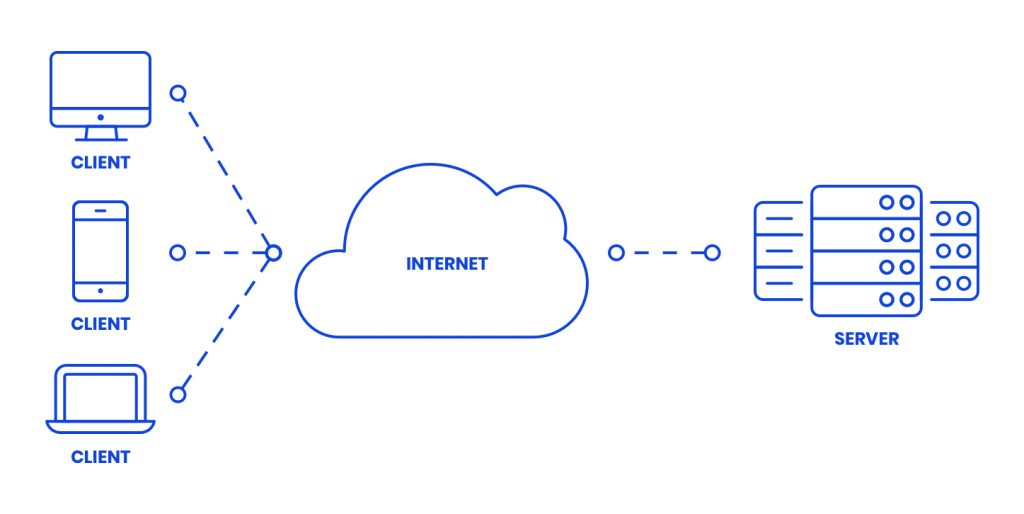
Example:
The computer that you are using to read this article is a client. You are using it to request information from the server that hosts combell.com. So, with your client, you actually download this website from the server on your own computer.
Servers kunServers can be used to store all kinds of data, but here we will focus on web servers, which host websites.
Continuously available
The servers of your hosting provider are always on, because some people may want to visit your website in the middle of the night. When that happens, your server must of course be up and running to keep your website available. The availability of a website can be measured using uptime: an uptime of 99.9% means that your website remains accessible 99.9% of the time. That may seem a lot, but it still means a downtime of 0.1%, which is 8 hours per year!
Top-notch hosting providers ensure 99.999% uptime. We do not want to brag about this, but Combell is one of those top-notch hosting providers 😬.
Security
Another important function of your web hosting provider is to ensure the security of your website.
Your web hosting provider is going to protect your website and data from hackers and other crooks. The threats posed by cybercriminals are getting bigger and more complex every day, which is why your provider is going to work hard to update the security of your servers on a very regular basis. Large providers such as Combell enjoy economies of scale in this regard: when you can spread the costs of securing an entire data centre full of servers over many different hosting packages, everyone gets a lower price.
Cost-effectiveness
In addition to continuous availability, there are a lot of other responsibilities and costs involved. Just think of the energy bill: if you were to run a web server by yourself, it would cost you a fortune. Since providers have several servers in a data centre, they can enjoy economies of scale and pay less for energy. Which is good for you as well.
Control
Your hosting provider will allow you to take control of your hosting package. With Combell, this can be done via a convenient control panel. There, you get a detailed overview of your settings, domain names and packages.
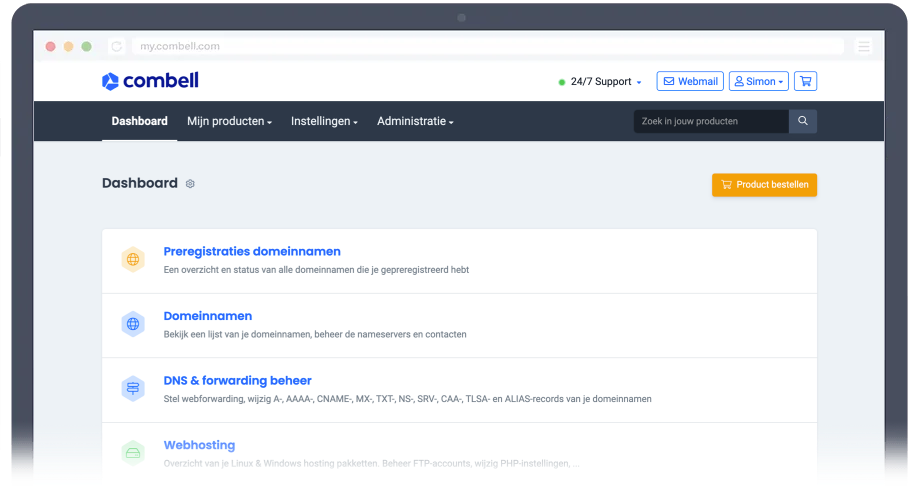
Data centres
Hosting providers usually have an entire facility full of servers: a data centre. Such a network of servers ensures high availability: when one server fails, another automatically takes over without you noticing.
What is a hosting package?
Your web hosting always comes in a package, meaning that it consists of several components.
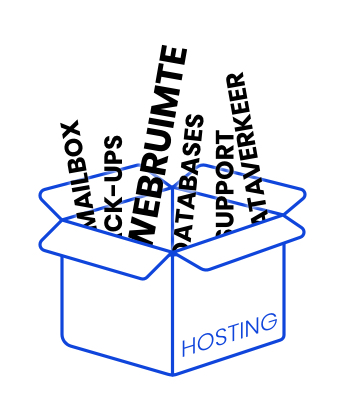
These are the most important components in such a hosting package:
- Webspace
A website contains photos, text, videos and all kinds of other data. That is why you need to rent web or disk space from your hosting provider. - Data traffic
When someone browses your website, that visitor repeatedly downloads information about your website from the server. The more people visit your website, the more data is downloaded from the server. Packages often offer unlimited data traffic, allowing you to handle an unlimited number of visitors. - Backup
Your provider will also back up (make copies of) your data. This will come in handy if you accidentally delete something, for example. - Mailbox
Hosting companies often also provide you with a mailbox, in which you can store your e-mails and from which you can send e-mails. This allows you to receive messages directly to your personal e-mail address (e.g. info@domainname.be). - Databases
A database is a collection of data, which you can quickly retrieve or edit. A database actually contains all the information contained in your website, arranged in orderly tables, without any of the frills you see on your actual web pages. Depending on your hosting package, you can manage one or more databases. - Support
When things go wrong, you want to get proper assistance. That is why it is advisable to have support included. At Combell, for instance, you get 24/7 support: this means you can call for help at any time of the day if there is something you do not understand 😉.
Check out all the hosting packages that Combell can offer.
What types of hosting are there?
Since large companies have different needs than one-man businesses or regular people who want to start a blog, there are different types of hosting. Below is a list of the most common ones.
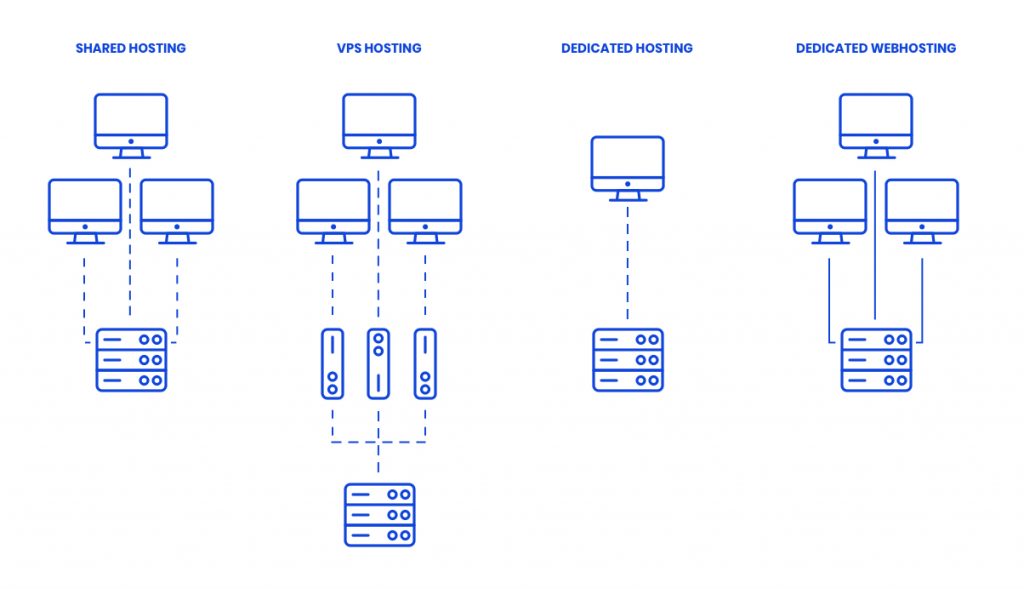
Shared Hosting
With shared hosting (or simply ‘web hosting’), you share a server with other users who rent it.
This means that one server can host several websites. And this is actually the case for most small websites: they are usually hosted on a regular web hosting package. This solution offers limited performance and space, but is particularly suitable for people who want a website that will not attract too many visitors.
The pros of shared hosting
- User-friendly: the control panel of your shared hosting with Combell is very intuitive. You do not even need any technical knowledge to manage your hosting package. Moreover, you can easily connect a website building tool (such as SiteBuilder) to your hosting package.
- Low costs: everyone shares the cost of the infrastructure and electricity. Shared hosting is therefore one of the cheapest hosting options.
- A renter does not have to worry about the infrastructure, as it is managed and maintained by your provider. Combell’s servers, for example, are always up to date with the latest security patches, so that those who rent the server do not have to lose any sleep over this.
The cons of shared hosting
- Your website will load (a little) slower: Since you are only using a portion of a whole server, the computing power of the server will also be slightly reduced for your website.
- Other renters may cause inconvenience. If a website is booming and generates a lot of data traffic, the other people who rent the server may notice that their own website is running too slow. In other words, if you make too much noise, your neighbours will also be affected 😉.
- There is a limit to the data traffic and storage space of your website. If your website and the number of visitors keep growing, you will have to upgrade. With Combell, you can switch hosting packages effortlessly, so you do not have to worry about that.
- You are tied to the settings of the server: you cannot configure it yourself.
A hosting provider can, however, help you overcome many of these drawbacks. Combell, for example, uses hosting clusters. This means that several servers are combined into one large ‘cluster’, allowing to allocate much more space and computing power to the various hosting packages.
In addition, Combell also uses SSDs on all its servers. These hard disks are much faster than normal ones, which improves the performance of all the websites hosted by Combell.
Combell also ensures that your website delivers high performance by not having too many sites on one server. This way, your website has the necessary room for manoeuvre.
Shared hosting is the best option for small websites that will not attract large numbers of visitors. If you expect to develop quickly, you should probably consider a different package.
Dedicated Web hosting
If Shared Hosting no longer meets the needs of your website, you can switch to Combell’s Dedicated Web Hosting.
The term says it all: it is web hosting, i.e. shared hosting, but with processing power and technical resources specifically allocated to you (dedicated). This means that your website will be more powerful, and that other users on the same server will not be able cause any inconvenience.
The pros of Dedicated Web hosting
- Very user-friendly: you use the same control panel as for a Shared Hosting package. Again, technical knowledge is not required.
- Faster loading speed: with a Dedicated Web hosting package, you can rely on a lot of computing power. It is as if you had your own server at your disposal.
- Relatively low costs. This is the cheapest way to upgrade your shared hosting package.
The cons of Dedicated Web hosting
- There is a limit to the data traffic and storage space of your website. If your website and the number of visitors keep growing, you will have to upgrade. With Combell, you can switch hosting packages for free, meaning you do not have to worry about that.
- You are tied to the settings of the server: you cannot configure it yourself.
Dedicated web hosting is the best option for companies that want a secure, stable, high-speed and high-capacity server, but that do not have the means to hire a technically savvy person. You get more space and higher performance than with ordinary shared hosting, but this solution remains user-friendly thanks to the very convenient control panel.
Dedicated Hosting
With Dedicated Hosting, you rent a whole server for your website to run on. Such a dedicated server is also called a bare metal server, because the software is installed directly on the server – without the need for partitions as with shared hosting. The difference with Dedicated Web hosting is that with Dedicated Hosting, you rent a whole server of your own.
You should, however, know that Dedicated Hosting is no longer a viable option, because the advantages do not outweigh the disadvantages. The fact, among others, that this is not an environmentally friendly solution is a major deal breaker for Combell.
Consequently, Combell no longer provides Dedicated Hosting services, but strongly believes in alternatives like Dedicated Web Hosting (see above) and Cloud Hosting (see below).
The pros of Dedicated Hosting
- No other users means no inconvenience. The only person who can overload the server is you. And you will have to bring out the big guns to do so, because you cannot overload a dedicated server so easily.
- Faster loading speed, because the server can use all its computing power just for you
- You have full control over the server, which means you can configure it to your own preferences, e.g. as regards security.
The cons of Dedicated Hosting
- The price tag is the biggest disadvantage: since you pay for a full server, this solution will also impact your wallet.
- Vulnerable: you are dependent on your server. When a critical component of your server fails, you cannot switch to a different computer in a flash. This means you will stay offline until the faulty component is repaired. This centralisation of data is not really useful.
- You need technical knowledge. Full control over your settings obviously means that you also need to be familiar with these settings.
- A private server is also not always an eco-friendly solution. With a shared server, all the space is used optimally, whereas a private server is often not used to its full capacity, which results in higher energy consumption.
Dedicated hosting is the best option for large companies that have a technically skilled staff and that are looking for a secure, stable, high-speed and high-capacity server. But: Dedicated Hosting is no longer viable. Today, Dedicated Web Hosting or Cloud Hosting have become much better options.
Cloud Hosting
“I’ll keep it in the cloud”: you have probably heard people say this a lot in recent years. The term cloud may give the impression that our data are somewhere in the sky, but obviously they are still stored on hard disks and computers. The cloud actually means ‘multiple computers’.
Cloud hosting is hosting on virtual servers, which get their computing power from a network of physical web servers. In other words, your virtual server gathers disk space and computing power from different servers, in order to work properly itself. And those servers can even be in different locations!
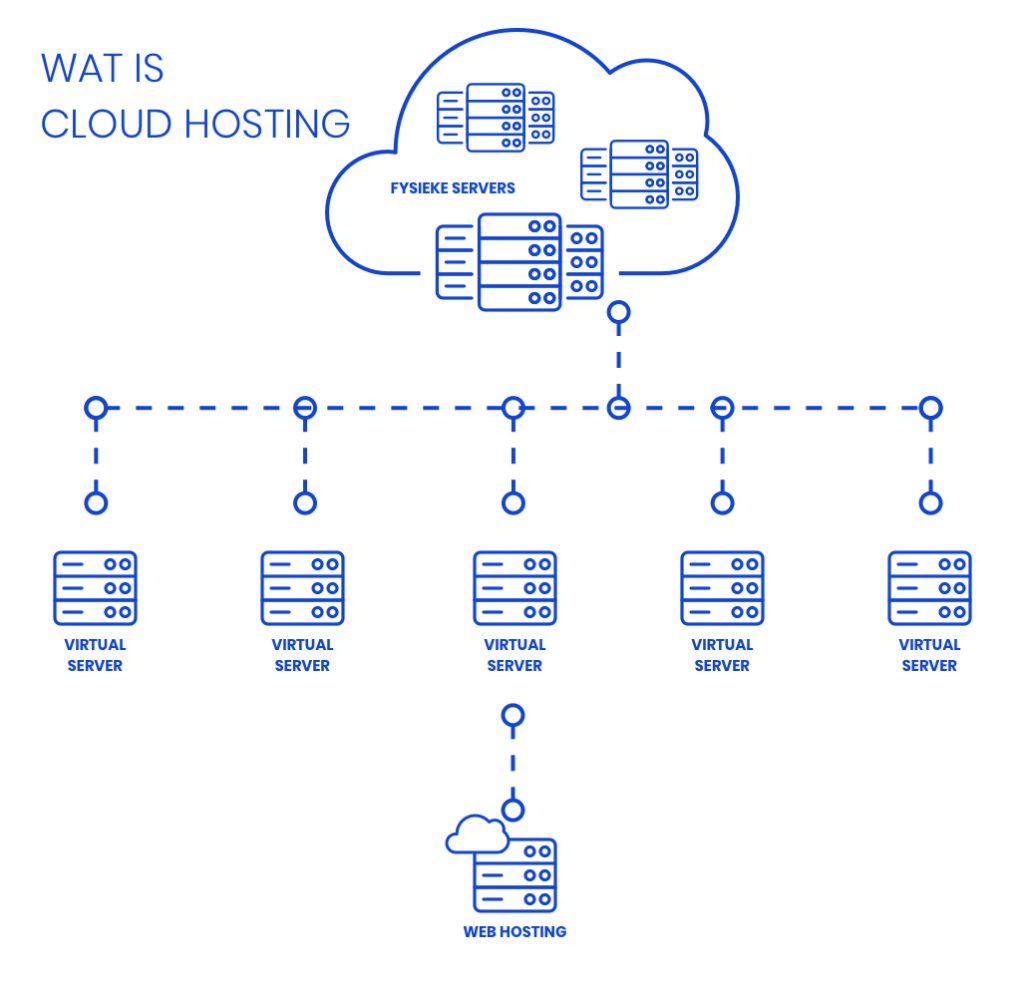
The pros of Cloud Hosting
- Continuity: Since your virtual ‘cloud server’ relies on different physical servers, it will always keep running, even if one of the physical servers requires maintenance. When the cloud server realises that a physical server is no longer running smoothly, it will turn to other physical servers in the cloud.
- Scalability: Adding or removing users, memory or computing power is very easy and does not involve any downtime.
- Minimal risk of data loss. Backups can be very easily stored in the cloud, and are copies of your whole virtual server.
- No technical knowledge required. With Combell, your hardware and software are managed by experts.
- Cloud hosting is green. Since physical servers are used optimally, their efficiency is very high, meaning that no energy is wasted! Virtual servers also help reduce the amount of hardware needed, which results in less production or transport.
The cons of Cloud Hosting
- The cost: Cloud Hosting is more expensive than Dedicated or Shared Hosting.
- Location: The problem with a lot of big players is that you do not always know where they keep your data. Your website can be hosted on a server in Belgium, but it could just as well be hosted in Florida or Peru.
With Combell, the location of your data is specified in your contract. This way, you know where your data are stored at any time. Combell’s cloud servers are located in Belgium and the Netherlands.
Cloud hosting is the best option for large companies that value flexibility. You use what you need, when you need it, and you only pay accordingly. In addition, cloud hosting is also a very environmentally friendly solution, because the servers are used in an optimal way.
VPS hosting
VPS hosting is the perfect compromise between Dedicated Hosting and Cloud Hosting. VPS means Virtual Private Server.
A Virtual Private Server is a private virtual server on a physical server. This means that several users use one server, but that server is virtually partitioned into multiple servers.
In other words, it is some kind of a hybrid between shared hosting (multiple users on 1 server) and dedicated hosting (1 personal server). VPS hosting is very similar to Dedicated Web hosting, but it is much easier to use.
With a VPS, you manage a virtual server, and you must also have the technical knowledge to set it up. That is why we tend to recommend Dedicated Web hosting for people without much technical knowledge.
Your hosting provider splits the server into multiple parts (‘partitions’) using virtualisation technology. This allows each user to fully control their own VPS, which is thus both virtual and private.
The pros of VPS-hosting
- You have full control over your VPS, just like with dedicated hosting.
- Other users of the physical server will not cause you any inconvenience: all users are neatly separated from each other.
- From an ecological point of view, a VPS is more efficient than a dedicated server, as the server is used in an optimal way.
- Your VPS is perfectly scalable: if you think you need more space, you can easily adjust it.
- VPS hosting is cheaper than dedicated hosting, because you share a physical server, and therefore also share the costs of that server.
The cons of VPS-hosting
- Loading time and capacity are still somewhat lower than with dedicated hosting.
- Vulnerable: due to your virtual server, you are dependent on your physical server. If the server does not work properly, your website may go offline.
- You need technical knowledge: Just like with dedicated hosting, you have to manage the settings of your server, which means you have to know how to do this.
A VPS is the best option for websites that have become too big for shared hosting, but that do not want to bear the full cost of a dedicated server. Websites for which security is a priority, such as web stores, should definitely consider a VPS. Of course, technical knowledge is required. If you do not have that knowledge, it is best to choose Dedicated Web hosting.
Websites whose traffic can fluctuate wildly also choose VPS hosting because it is easily scalable: after a peak, you can switch back to a smaller VPS. This is what happens with websites like those used to promote events, where high traffic peaks occur when ticket sales start.
In addition to the above hosting packages, there are a few more we should mention.
WordPress-hosting
You can also opt for hosting that is specifically aimed at users of a certain CMS (Content Management System), like WordPress. For those who are not familiar with CMSs, these systems help people build and maintain a website.

WordPress hosting is a type of hosting that will help you boost the performance of your WordPress website and that perfectly matches the needs of WordPress in terms of security. With WordPress hosting, WordPress is already preinstalled on your hosting package.
There are also other CMSs, such as Joomla, Drupal or Magento. For these CMSs, Combell also offers specific CMS hosting.
In addition to regular WordPress hosting, most hosting providers also offer managed WordPress hosting. With such a solution, your hosting provider ensures that the WordPress software on your server is always up to date.
Reseller Hosting
If you are not yet completely overwhelmed by all the different types of hosting solutions available, we have another one for you: reseller hosting. This works a lot like subletting: you can split your own hosting package into smaller parts, so that new users can use them.
As a reseller, you are responsible for the settings of your hosting, and for the support provided to every user of your package.
Reseller Hosting is the best option for companies that build and manage websites for their customers. It allows you to provide hosting services to your end users without actually owning a server.
Managed Hosting
As we already mentioned above regarding Dedicated Hosting and VPS hosting: sometimes, technical knowledge is necessary, because you have to manage your server by yourself. Not every user wants to or can afford to hire an IT specialist to keep his website running smoothly, but sometimes it is really necessary to switch to a more advanced package, for example when the number of visitors has increased significantly.
But Combell will help you out with this by offering a managed version of almost all types of hosting. If you go for this kind of service, Combell will take care of the maintenance of your entire package. This means that you no longer have to worry about your hardware and software, as those will usually be the responsibility of Combell.
This means that if your website gets too big for Shared Hosting, you can switch to a more advanced package with managed hosting, without needing any technical skills.
Managed Hosting is the best option for those who have a website that is critical to their business, but who do not have the necessary technical or IT skills in-house.
FAQ
A hosting provider offers you disk space to host your website, and ensures that your website remains available.
When choosing a hosting provider, you should bear in mind a few important criteria.
– Not all hosting providers offer all possible hosting solutions, so think about how you want to build your website first. Are you looking for an easy SiteBuilder? Or do you prefer WordPress after all?
– How reliable is your hosting provider? Check which SSL certificates it offers to secure the connection to your website.
– What is the plan for your website? Can your hosting provider handle the growth of your business?
– How important is support when you are struggling with problems
Since you have to start somewhere, Combell offers many different types of hosting.
With shared hosting, you share a server with other renters. This is cheaper than renting a whole server, but the computing power and speed of your website is slightly slower.
A hosting package is the package that your hosting provider offers. It contains everything you need to keep your website up and running. Usually, you can host several websites on such a package.
Running your own server for your website is usually a bad idea. You may pay less if you manage your server yourself, but keep in mind that this is also a major source of stress.
Configuration, backups, security… all these things add up to a lot of work.
If you are an experienced system administrator, you can embark on this path, but otherwise, we recommend not to do so. And this is certainly not because we are hosting providers ourselves – although the hosting services provided by Combell are very convenient 😉.
Web hosting refers to the place on the Internet where you can upload your website. Your domain name only functions as the address of your website. So, for a website, you need both web hosting and your own domain name.
Web hosting prices vary depending on your chosen hosting package. Combell offers web hosting packages from as little as €5.99 per month.
The type of web hosting you should choose depends on many factors, including the expected data traffic, your budget and the desired security and speed.
Read our blog for more information.
If you want to be sure that no one walks away with your dream domain name, you can buy it without having to buy hosting to build a website.